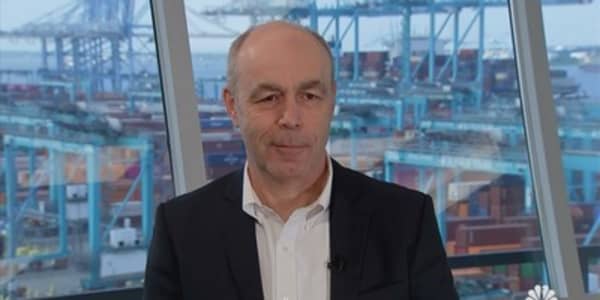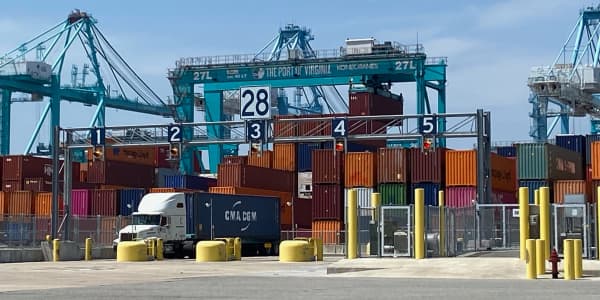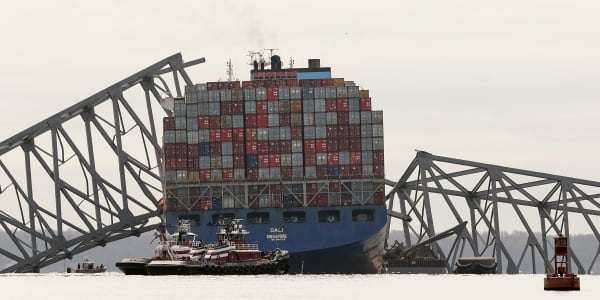The freight transport sector has faced a volatile year, with a series of bankruptcies as a result of diminished freight rates and a lack of cargo as demand waned, but Lior Ron, CEO of Uber's logistics subsidiary Uber Freight, says the freight recession may be at a new "tipping point."
The reason is fuel prices.
Ron said Uber Freight is witnessing more carriers giving back lanes after bids, which could be an indicator of carriers unable to afford to run certain shipping routes.
"Low fuel prices earlier this year likely helped many carriers manage through low rates, but increasing fuel costs may be a tipping point for carriers operating with little to no margin," Ron said.
Shipper volumes are still down, and carrier rates are still depressed. And so far in Q4, he said Uber's team has observed carriers being more selective on the volume that they take in bids to remain profitable. Shippers, meanwhile, are being more selective on their carrier mix and have been leaning toward selecting carriers they think are stable and provide good service, Ron said.
Oil prices have come down from their recent peak, and global economic growth is projected to slow next year, but geopolitical risks remain high, from the Russia-Ukraine war to the emerging Israel-Hamas war in the Middle East. The World Bank warned in a report on Tuesday that record high oil prices could be reached if the conflict spreads beyond the Gaza Strip, and the price of crude able to rise as high as $157. Bank of America recently released a similar worst-case scenario forecast.
"Fraught with uncertainty" is how the International Energy Agency recent described the conditions in the oil market.
The World Bank's baseline case assuming there is no oil shock would result in an average price of $90 a barrel in the current quarter before crude heads lower in 2024 to an $81 average amid slower global growth.
Loading chart...
The sharp decrease in freight rates and demand after the pandemic boom contributed to the demise of venture-backed darling Convoy. Flexport, another heavily funded logistics startup, recently had a CEO shakeup and another round of layoffs in October affecting 20% of its global workforce.
Global shipping container rates have dropped by more than half compared to a year ago, and are now below the pre-pandemic rates of 2019.
"Numbers don't lie," Ron said. "If you look at the asset side, the cost of managing a fleet is increasing and it's hard to escape that. I believe the contract pressure will continue. The non-diversified brokers and subscale, less financially sound players are feeling a lot of pressure."
Convoy co-founder and CEO Dan Lewis cited the "massive freight recession" in a memo to employees explaining its demise.

Uber Freight has had its own challenges this year. In February, it issued a bearish outlook on the freight market after the company cut approximately 150 jobs, 3% of its workforce. The company had a second round of layoffs in July of between 40-50 employees.
As it navigates through the freight recession, Uber Freight is doubling down on sustainability measures, which have been a focus among VC-backed freight and logistics startups including Convoy.
Using data analytics, AI, and matching/routing solutions, Uber Freight just released a sea-to-sky emissions dashboard to provide full visibility and eliminate what's called, "empty miles," which add to costs, delivery time and climate impact. The company hopes to streamline the transit of freight which would cut down consumer costs and increase transport productivity.
"So far we have been able to eliminate 2.4 million empty miles this year," Ron said. "Clients are also transitioning freight to cheaper, more sustainable options like intermodal," which involves moving containers across a combination of transport options such as road, rail and maritime.
Ron explained you can only reduce empty miles if you digitize the entire supply chain.
"To achieve sustainability at scale, you need a diversified portfolio," he said. "This is powered by technology, which runs through all the segments of business."
Empty miles account for around 30% of U.S. trucking miles, according to Uber Freight data, and the company estimates that empty miles can be reduced to as much as 15% with routing and bundling technology.
"That translates into a 10-15% increase in income, not even including the energy savings," Ron said. "Our goal is 80% clean transportation across global brokerage shipments by 2040. It's an ambitious goal, but we want to hold ourselves accountable. We have a path, a model, and have made the right investments to get there."
Autonomous trucking is part of the model that Ron says will help the company achieve these goals. Uber Freight has been hauling commercial loads since 2021 with its autonomous trucking partner Aurora. Other partnerships include Volvo's autonomous unit, and more recently, Waabi. Uber Freight's autonomous trucking program makes daily runs with select customers in Texas to help identify where autonomous trucks are needed most to alleviate supply chain bottlenecks.
"We want to help and support shippers and their chief sustainability officers," Ron said. "We believe sustainability can help increase their bottom line."
Some of Uber Freight's large shippers include AB InBev, Nestle, and Land O'Lakes.
Even though there is pressure across the sector, he said transportation carriers and shippers are preparing for a holiday season upswing, which includes both Thanksgiving and Christmas, and then into 2024, the Lunar New Year in February. Though some big retailers remains cautious about the consumer, including Target, whose CEO told CNBC on Thursday that the spending pullback is even starting to hit groceries.
"The next few weeks will be very telling," Ron said.





